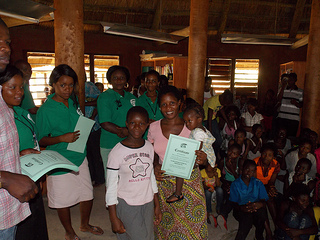Eleni witnesses the power and joy of LubutoMentoring and LubutoDrama
On November 3 and 10, LubutoMentoring program had its two wrap-up sessions at both of the Lubuto Libraries. The Reading Room was full to capacity. Children and youth that participated in the weekly program in the preceding 12 weeks were seated in two tightly squeezed rows along the talking circle: youth who live in the street next to school-going children; even the middle of the talking circle was full. Several parents were sitting on the benches in the big alcove across from the entrance and on the stools brought over from the Arts Room. All of the mentors were present and the library staff was busy with cameras and camcorder.
More than 100 of the youth who had participated stood up in each library to receive their participation certificate (for 50% or better participation) while the remaining kids were wildly applauding them. Thirteen-year old Kafula, who has never been to school and who comes to Ngwerere Lubuto Library every day to try to learn to read there, broke down to tears: this was the first time she had received some recognition for a personal achievement. Kenny, as the coordinator and outreach officer, had something special to say to each kid whose name was called, to the enthusiastic agreement of the audience. In between names, he often shouted slogans from the mentoring lessons, which the audience repeated or responded to, in one thunderous voice.
Those who had a mother or father present proudly posed for a photograph with them. The kids who came directly from the street or those living at Fountain of Hope were treating Nikki, the librarian, as their mother and strived to have a photo with her. After the certificates of participation, several prizes were awarded to the youth with the best participation in terms of contribution to the sessions and attendance. To those in school, school supplies were offered. Those were the kids who almost never missed a session and who learned to voice their opinions and stand up and talk about their experiences. Some, still dazed from happiness, were urging us to continue with the program. More photographs with those parents who were present were taken... but the loudest and most heart-felt applause went to the few youth who although out of school won prizes (footballs for the young men; toiletries for the near-deaf girl who never made it to a formal classroom but participated well in this program; skipping rope and beads for Kafula). The Reading Room was full with strong, positive energy, and a feeling of oneness. It was really moving. At that point, it was clear that all the effort for everything that had to take place to bring us to that point was worthwhile.
The first story of the LubutoDrama 2012 partnership with Barefeet Theatre was performed for the public at the Fountain of Hope Lubuto Library early afternoon on October 26. This was a traditional African story also used in the LubutoMentoring program to exemplify the value of caring for others: A test for choosing a Chief.
The Fountain of Hope Lubuto Library outdoor space was put to best use with this performance: the Reading Room was used as back stage and entrance to the Palace; the open space between the Reading Room, the Art Room, the Insaka and the old indigenous tree formed the orchestra where action took place. The audience squeezed wherever they could, some seated on the ground, some on the low walls of the insaka, a lot on the plinth of the buildings, and a lot more standing. The tree, the Arts Room and the Insaka provided much-appreciated shade. The performance was in Cinyanja, the language most widely spoken in Lusaka. All acting, singing, dancing, drumming and all the props were by the children participating in the LubutoDrama program. The facilitators and the general direction was from the Barefeet Theatre. Two trainee facilitators from Lubuto worked with everyone in 6 workshops to prepare the performance. It was wonderful! Everyone did a very good job, from the girl with the extra-flamboyant dress in the Chief's court to the feisty 5-year old boy who played one of the Chief''s guards. The boy, however, that played the old Chief, who had to portray the wise Chief both in his full authority and as a handicapped beggar (who was testing the candidates for the new Chief's position) was amazing! The whole point in this story is to show that caring for others is a paramount value in society and in a leader. Laughter generated in the audience when the handicapped beggar was abused by the other candidates really pointed to the need for such issues to be discussed among the children and the youth, and the importance of doing that in ways that are not didactic, such as in drama. While LubutoDrama reaches out to all children, it sometimes also uncovers brilliant talent!


